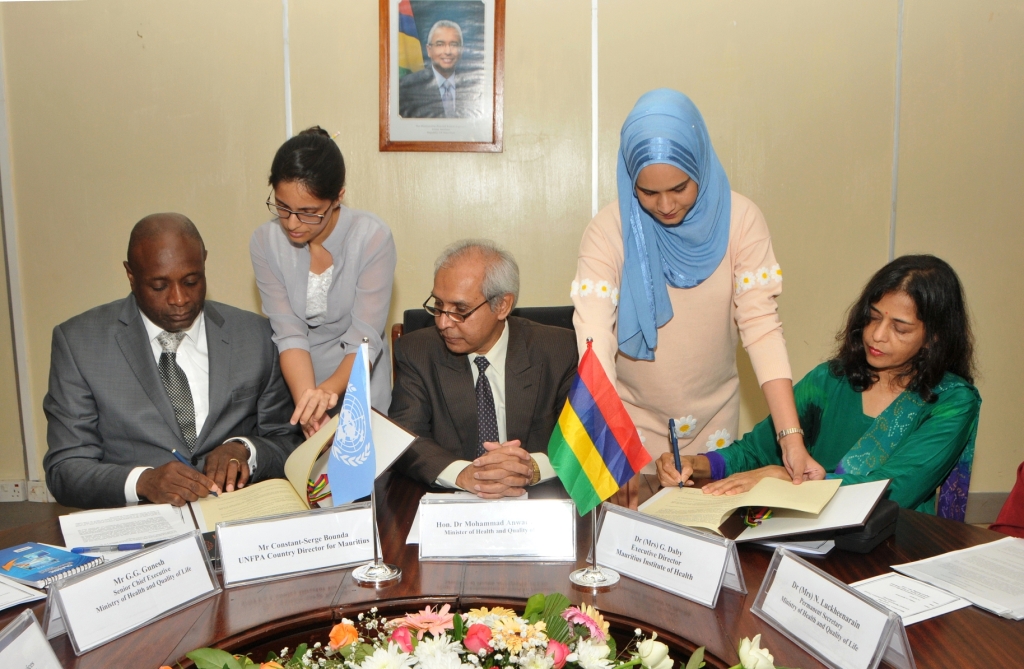 Regional Training Centre of Excellence
Leadership initiatives of Mauritius Institute of Health in training African health personnel on reproductive health and gender.
Regional Training Centre of Excellence
Leadership initiatives of Mauritius Institute of Health in training African health personnel on reproductive health and gender.

Challenges
The establishment of a regional family health training centre in Mauritius for sub-Saharan African health workers has been supported by UNFPA since 1982. The initiative was strategic given the high birth rate in Africa, as well as the success of the family planning programme in Mauritius and its proximity to other African countries.
The Mauritius Institute of Health (MIH) served as a regional training centre providing continuing education to local health staff and undertaking relevant training and research in reproductive health. After 1994, in line with the International Conference on Population and Development agenda, the training programme was redesigned and came to be known as the Training of Trainers in Reproductive Health Course, with a focus on family planning.
Towards a Solution
A Memorandum of Understanding between MIH and UNFPA was signed aimed at strengthening regional cooperation in the field of sexual and reproductive health (SRH). The aim is to continue to build capacity development across sub-Saharan Africa in SRH and related areas.
The training offered by MIH, including distance learning courses, focused on family planning and maternal health, STIs/HIV AIDS, gender issues and security of reproductive health commodity supplies, among other topics and was geared towards priority needs in countries of the region. Related research, on the other hand, dealt with health systems, epidemiological studies and program evaluations.
Result
Some 1,500 health personnel had been trained by MIH coming from the Comoros, Eswatini, Lesotho, Madagascar, Namibia, Seychelles and Zambia as well as local health personnel in Mauritius, including MIH training coordinators.
Financial assistance was provided to support participation of selected candidates in various short-term and long-term courses.
To ensure that the specific needs of countries were addressed, MIH tapped the expertise of UNFPA, WHO, ILO and various universities. Moreover, MIH engaged additional partners such as UNICEF, Southern African Development Community and the Francophonie University Association.
Lessons Learned
The family planning centre of excellence was in a viable position to support partnerships among countries under the South-South cooperation framework. The challenge is to continue to innovate in order to sustain its comparative advantage both at the regional and global level.
Contact Information
Countries involved
Supported by
Implementing Entities
Project Status
Project Period
Primary SDG
Secondary SDGs
Similar Solutions
| NAME OF SOLUTION | Countries | SDG | Project Status | |
|---|---|---|---|---|
A Billion Brains: Smarter Children, Healthier Economies High Level Meeting on South-South Cooperation for Child Rights |
Comoros, Eswatini, Lesotho, Madagascar, Mauritius, Namibia, Seychelles, Zambia | 17 - Partnerships for the Goals | Completed | View Details |
Accelerating the Implementation of African Union Treaties in São Tomé and Príncipe South-South learning from the Beninese judicial system’s experience in the application of human rights treaties to its national law |
Comoros, Eswatini, Lesotho, Madagascar, Mauritius, Namibia, Seychelles, Zambia | 05 - Gender Equality | Completed | View Details |
Accelerating the Transformational Shift to a Low-Carbon Economy in Mauritius Towards supplying 35 percent of the country’s energy needs with renewables by 2025 |
Comoros, Eswatini, Lesotho, Madagascar, Mauritius, Namibia, Seychelles, Zambia | 05 - Gender Equality 09 - Industry, Innovation and Infrastructure 13 - Climate Action | Ongoing | View Details |
Accelerator Labs Network Following collective intelligence methods to address emerging sustainability challenges and the growing demand for local solutions |
Comoros, Eswatini, Lesotho, Madagascar, Mauritius, Namibia, Seychelles, Zambia | 08 - Decent Work and Economic Growth 13 - Climate Action | Ongoing | View Details |
Accessibility of Financial Services and the Private Sector in Africa Maximizing the impact of financial cooperation on economic development and industrialization in Africa |
Comoros, Eswatini, Lesotho, Madagascar, Mauritius, Namibia, Seychelles, Zambia | 08 - Decent Work and Economic Growth | Completed | View Details |
